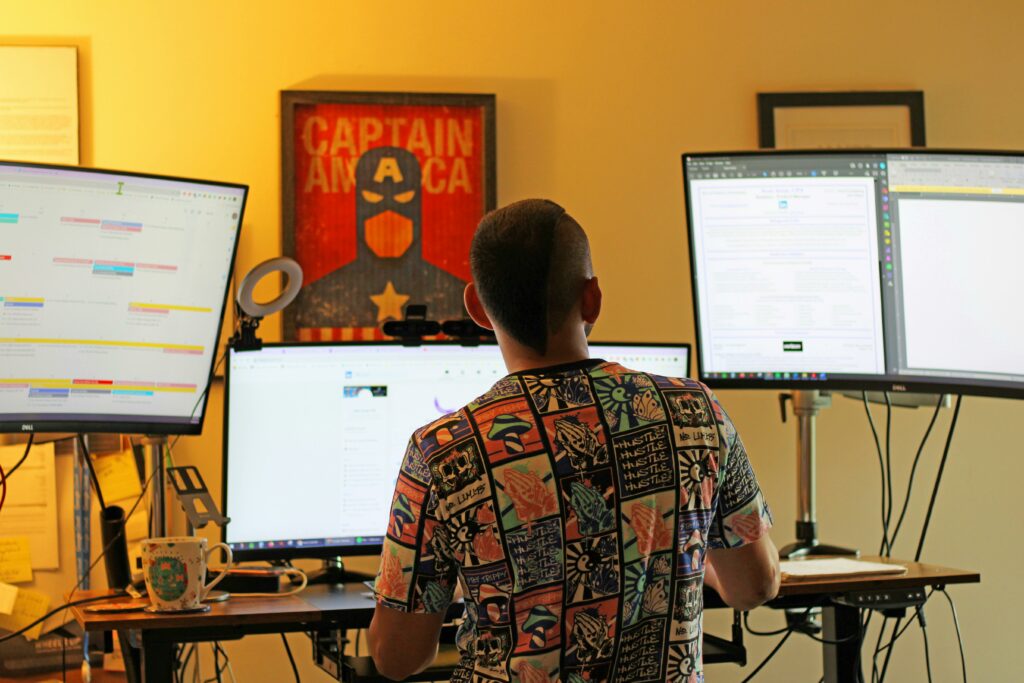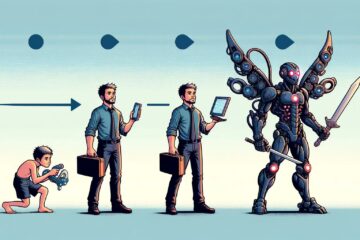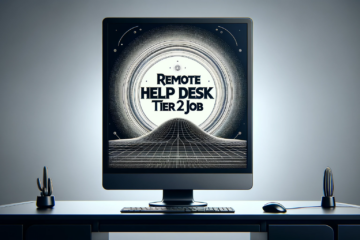In today’s digital-first world, online job interviews have become a standard for hiring, especially in industries like IT and managed services. As an MSP, you’re likely involved in hiring support staff or specialists remotely. But have you ever wondered what sets a successful online interview apart from a lackluster one?
In this article, we’ll break down key tips for acing an online job interview. Whether you’re looking to hire the best talent for your MSP business or preparing for an interview yourself, these tips will help you present yourself in the best light possible.

Ensure Reliable Internet and Power Backup for Your Online IT Job Interview
Before diving into the more specific aspects of your online job interview, don’t overlook the basics: internet connection and power backup. A stable internet connection is crucial for smooth communication. Make sure you have backup data to combat that annoying Murphy’s Law!
Also, ensure you’re fully charged or plugged into power for the interview. Nothing kills an interview faster than losing power mid-conversation. If possible, have a backup power source—like a portable charger or an extra power cord—on hand. This simple preparation will give you peace of mind and avoid any technical disruptions that could hurt your chances.
1. Set Yourself Up for Success with Good Audio

One of the most important aspects of any online interview is clear audio. Poor sound quality can create frustration and hinder communication. A simple but powerful investment in your audio setup can significantly improve your professional image.
Why Audio Quality Matters
During a job interview, every word counts. If the interviewer can’t hear you clearly, it may lead to misunderstandings and frustration, making it harder for them to form a positive impression.
Tip: Invest in a good USB headset with a boom microphone, like the Sennheiser models, which offer professional-level sound quality without breaking the bank. Avoid using your laptop’s built-in microphone—it simply won’t deliver the same clarity, and the difference is noticeable.
When using a headset, you’re not just improving your sound quality; you’re presenting yourself as someone who values professionalism. It’s a small investment that pays big dividends.
Example Comparison:
- Laptop Mic: Flat, hard to hear
- Headset Mic: Clear, professional
2. Perfect Your Camera Setup and Lighting
In a remote job interview, first impressions are formed not just by your words, but by how you present yourself visually. Poor lighting or an awkward camera angle can make you look unprofessional and diminish your chances of success.
Camera Position: Aiming for Eye Contact
Camera angle plays a critical role in your visual presentation. If your camera is positioned too low or high, it can distort your appearance and give a poor impression. For instance, placing the camera below your face will show unflattering angles, like double chins.
Tip: For the best results, position your camera slightly above eye level to give the appearance of looking directly into the interviewer’s eyes. Whether you’re using a laptop or a smartphone, make sure the camera is stationary—no one wants to see a bouncing, shaky video feed.
Lighting: Ensuring Visibility
Good lighting is another crucial element. Ideally, you want enough light to clearly illuminate your face without creating harsh shadows.
Tip: Position yourself in front of a light source, like a window or a lamp, to ensure your face is well-lit. If possible, invest in a ring light for consistent, flattering lighting.
It’s also essential that the background is not distracting. A clean, simple background helps keep the focus on you. If you have a professional setting—like an office space—that works best, but even a tidy home office will do.
3. Dress Professionally – But Keep it Smart Casual

What you wear during an online IT job interview can be just as important as how you present your skills. The goal is to strike a balance between professionalism and comfort, particularly in remote roles where a more relaxed dress code is often expected.
Smart Casual is Your Best Bet
In the world of remote job interviews, it’s important to avoid overdoing it. While you don’t need to wear a suit, dressing too casually can give the impression that you’re not taking the interview seriously.
Tip: Opt for a simple, smart-casual look—like a plain black or white shirt, which is professional without being distracting. Avoid overly bright or flashy colors, as these can shift the focus away from what you’re saying.
A button-up shirt can also work well for a remote interview, but steer clear of a tie or a suit. These can look out of place and give the wrong impression that you’re trying too hard to impress.
Less is More
When it comes to remote job interviews, less is more. You want the interviewer to focus on your qualifications, not your clothing. Keep your outfit simple, clean, and appropriate for a professional setting.
4. Start with A Casual Exchange to Build Rapport

Just like in a face-to-face interview, breaking the ice is essential in an online job interview. Starting with some light but interesting topics helps put both parties at ease, making the interview feel more like a genuine conversation.
Keep It Brief but Personal
Show that you’re comfortable in your environment and engaged in the conversation. You can briefly mention your home office setup, how you’re managing remote work, what you like about it, your hobbies, or other personal interests that help the interviewer connect with you.
Tip: Keep it short—around two to three minutes. If the interviewer is interested, they may ask follow-up questions, but remember to pivot back to the professional focus of the interview. This causal connection will set the tone for the rest of the conversation.
5. Avoid Over-Flattering or Impressive Remarks
While it’s important to show interest and enthusiasm about the company, over-flattery can come across as insincere. Authenticity is key, and your compliments should come from a genuine place.
Genuine Compliments Work Best
Compliment the company based on real, meaningful observations. For instance, you could mention their use of a tool you’ve worked with, like ConnectWise, or express how their company values resonate with you.
Tip: Instead of saying, “Your office looks amazing!” focus on the company’s achievements or something you admire about their operations. For example, “I noticed that you’re using ConnectWise for your ticketing system—I’ve used it before and really appreciate its functionality. I’d love to contribute to a team that utilizes such a great tool.”
Avoid trying to impress them with superficial comments. Authentic compliments go much further than empty flattery.
6. Show You Can Think Like a Manager

One way to stand out in an interview is by showing that you understand the challenges and considerations of management. This is particularly important for MSPs and IT professionals, where collaboration and team dynamics are key to success.
Demonstrating Leadership Potential
Even if you’re not applying for a management role, it’s valuable to demonstrate your understanding of how the company operates as a whole. Show that you know how to contribute to a team’s success and that you have the potential to grow into leadership responsibilities. MSPs often make senior tech managers and that often turns out to be a bad practice. Focus on the business aspects rather than only the technical.
Tip: Ask insightful questions about the company’s operations. For instance, “How does your team handle workload distribution during peak times?” or “What is the management style that works best for your remote teams?”
7. Be Honest and Open About Your Weaknesses
No one is perfect, and it’s crucial to demonstrate honesty and self-awareness during an interview. When asked about your weaknesses or past mistakes, answer honestly and show how you’ve grown from those experiences.
Learning from Mistakes
Discuss a past mistake, but focus on what you learned and how you’ve improved since then. Employers want to see that you’re open to feedback and committed to self-improvement.
Tip: Instead of saying, “I don’t have any weaknesses,” be specific about an area where you’ve had to work hard to improve and demonstrate how you’ve made progress.
8. Prepare Smart Questions

Good job candidates ask thoughtful questions. It shows that you’re engaged in the interview and thinking critically about how you fit into the company.
Asking the Right Questions
Before the interview, research the company and prepare a list of relevant questions that demonstrate your understanding of their business and your desire to contribute. Be engaging and show that you are genuinely interested in the company – and, if you are not – why even apply there in the first place? As an example, If it’s a staff outsourcing company that’s interviewing you, you could ask where their staff is located.
Tip: Ask about the company culture, the team’s dynamics, or how the organization plans to grow in the next few years. These questions show that you’re invested in the company’s future and not just looking for a paycheck.
9. Don’t Seem Desperate – Be Confident
Lastly, when you’re in an interview, it’s important not to appear desperate for the job. Demonstrate that you are an attractive candidate, but be subtle about it. This gives you a sense of power and shows that you’re a sought-after candidate.
Avoiding Desperation
While you don’t want to seem disinterested, it’s important to show that you’re evaluating the company as much as they’re evaluating you – it is an exchange, not an interrogation! Mentioning other interviews you’re in can signal that you’re a strong candidate, but avoid sounding arrogant.
Tip: A simple, confident statement like, “I’ve had other interviews and are weighing my options,” when raised naturally in the conversation, conveys that you’re in demand without sounding desperate.
Final Words on Nailing Your Online IT Job Interview
By paying attention to audio quality, camera setup, attire, and communication, you’ll present yourself as a professional ready to join any MSP team. Show genuine interest, ask insightful questions, and don’t forget to be yourself—authenticity will always win the day.
Good luck, and may your next remote job interview lead you to the career of your dreams!



0 Comments